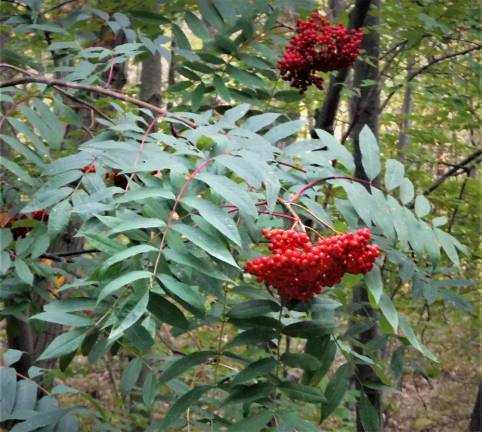Your cliffside multivitamin


While hiking through the woods in autumn, keep a keen lookout for the luminous mountain ash. Clusters of edible fruits droop from the leafy boughs or bare branches of this small gray-barked tree, prime for the picking. Fruits are small, no more than a ¼-inch in diameter, but eye-popping red when ripe and shaped liked little apples.
Look for mountain ash (Sorbus americana) in the mountains, sharing space with balsam fir and birch or on rocky cliffs all by itself. It’s not so much about elevation for this tree, but rather a location in which it can soak up the sun while still remaining relatively cool. Although not a true ash tree, mountain ash has pinnately divided leaves that resemble those of the true ash. In fact, it is a member of the rose family, related to our familiar apple trees. Mountain ash is also frequently called rowan tree and its fruits called rowanberries; however, its fruits are not true berries, but pomes, also like apples.
Mountain ash fruits are rich in vitamins A and C, as well as iron. In flavor, fruits are bitter and astringent when they first ripen, but good and sour after several frosts – in the winter or a long stint in your freezer. In general, their texture is mealy, yet when prepared as a compote, they are delicious. Simmer ripe mountain ash fruits with apple slices and a little water until softened. Like apples, mountain ash fruits contain malic acid, which conveys a palatable sour flavor, so the two fruits work well together. Press fruit mash through a fine mesh strainer to separate seeds and skins from pulp. Add sugar or honey to desired sweetness. Rich in pectin, mountain ash lends itself to jellies and jams as well. Feel free to sample fruits raw, although too many can sometimes cause stomach upset because of parascorbic acid content.
Thanks to their astringency and nutritional content, mountain ash fruits have also been used medicinally. Simmer fruits in hot water and strain for an infusion that is excellent in warding off colds or reducing cold symptoms such as a sore throat. Mountain ash serves as a reminder that food is sometimes truly the best medicine, so enjoy them not only as compote and tea, but tossed in soups, stews and sautés, or any way you like to promote general health.